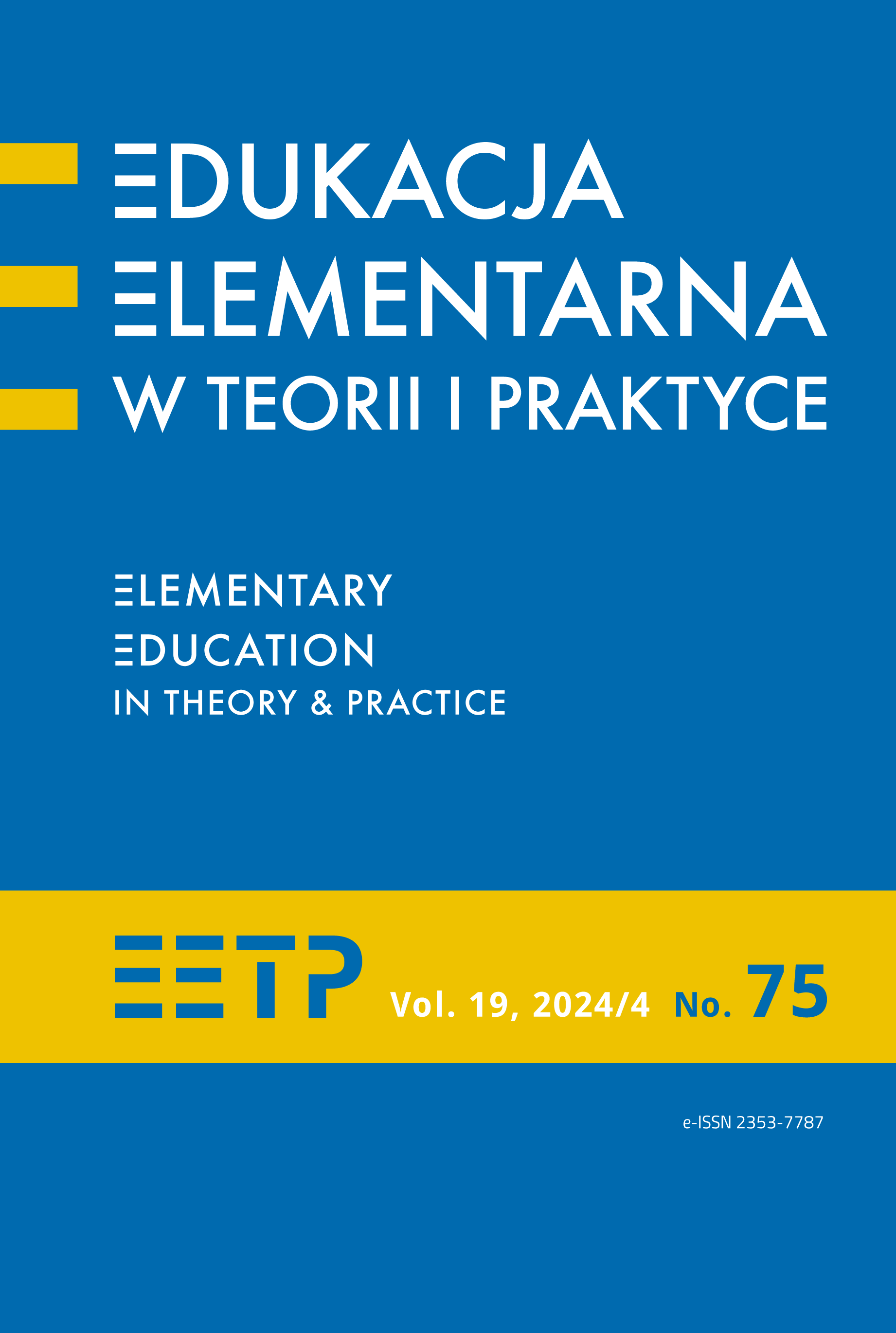Zaangażowanie studentów kierunków nauczycielskich w edukację dla zrównoważonego rozwoju – przykłady dobrych praktyk
Abstrakt
Edukacja XXI wieku stawia przed nauczycielem wiele wyzwań. Umiejętność poradzenia sobie w dynamicznie zmieniającym się środowisku, nowe technologie, rozwijanie kompetencji przyszłości (w tym kompetencji miękkich), wrażliwość na problemy współczesnego świata to tylko niektóre z nich. Jednym ze sposobów poradzenia sobie z tymi wyzwaniami jest propozycja edukacji dla zrównoważonego rozwoju. Jej odpowiednia realizacja, co wymaga adekwatnego przygotowania nauczyciela do zawodu, może przyczynić się do budowania zrównoważonego społeczeństwa.
Celem artykułu jest przedstawienie dwóch inicjatyw realizowanych w ramach projektu Kids Lab for Sustainability – wspólnoty uczącej się oraz kursu online, kierowanych m.in. do studentów kierunków nauczycielskich Uniwersytetu Ignatianum w Krakowie. Ich prezentacja koncentruje się na ukazaniu zaangażowania studenta w propozycję nabywania wiedzy oraz umiejętności praktycznych w temacie edukacji dla zrównoważonego rozwoju. Uczestnicząc w poszczególnych etapach projektu oraz realizując kurs online, studenci mieli możliwość poznania założeń edukacji opartej na tym nurcie, a także byli zachęcani do praktycznego testowania propozycji (scenariuszy/zasobów) zajęć, proponowania ich modyfikacji, własnych pomysłów czy autorskich rozwiązań. Propozycja tak zorganizowanej pracy spowodowała pozytywny odbiór i wysokie zaangażowanie studentów w przedstawiane przez członków projektu aktywności. Studenci doceniali zarówno atrakcyjność materiałów (scenariuszy/zasobów) opracowanych przez zespół realizujący projekt Kids Lab for Sustainability i zamieszczonych na jego stronie, jak i sposób przekazu wiedzy.
Bibliografia
Ardoin, N.M., Bowers, A.W., Wyman, Roth, N., Holthui, N. (2018). Environmental education and K-12 student outcomes: A review and analysis of research. The Journal of Environmental Education, 49(1), 1–17. https://doi.org/10.1080/00958964.2017.1366155
Batorczak, A. i Klimska, A. (2020). Edukacja na rzecz zrównoważonego rozwoju – refleksje przed ogłoszeniem nowej Dekady na rzecz Zrównoważonego Rozwoju (2020-2030). Studia Ecologiae et Bioethicae, 18(2), 17–26. https://doi.org/10.21697/seb.2020.18.2.02
Bińczyk, E. (2018). Epoka człowieka. Retoryka i marazm antropocenu. Wydawnictwo Naukowe PWN.
Borys, T. (2010). Dekada edukacji dla zrównoważonego rozwoju – polskie wyzwania. Problemy Ekorozwoju, 5(1), 59–70. https://yadda.icm.edu.pl/baztech/element/bwmeta1.element.baztech-article-BPL2-0017-0005
Europejska Komisja Gospodarcza ONZ. (2008). Strategia Edukacji dla Zrównoważonego Rozwoju. https://unece.org/DAM/env/esd/strategytext/strategyinPolish.pdf
Fundacja Gospodarki i Administracji Publicznej. (2020). Poza horyzont. Kurs na edukację. Przyszłość systemu rozwoju kompetencji w Polsce. https://media.freshmail.mx/userfiles/0cl8p8ise4/2575305f60fa0deb862e89163a26f9a41598431986.pdf
Instytut Badań Edukacyjnych. (2013). Umiejętności Polaków – wyniki Międzynarodowego Badania Kompetencji Osób Dorosłych (PIACC). http://eduentuzjasci.pl/images/stories/publikacje/ibe-raport-PIAAC-2013.pdf
Jeronen, E. (2022). Sustainable Education. W: S. Idowu, R. Schmidpeter, N. Capaldi, L. Zu, M. Del Baldo i R. Abreu (red.), Encyclopedia of sustainable management. Springer. https://doi.org/10.1007/978-3-030-02006-4_237-1
Kalinowska, A. (2007). Dekada Edukacji dla Zrównoważonego Rozwoju – zmniejszanie barier. W: A. Kalinowska i W. Lenart (red.), Wybrane zagadnienia z ekologii i ochrony środowiska. Teoria i praktyka zrównoważonego rozwoju: wybór wykładów z lat 2004–2007 (s. 45–50). Uniwersyteckie Centrum Badań nad Środowiskiem Przyrodniczym.
Kids Lab 4 Sustainability. (b.d.a). Kompostownik i pożyteczne dżdżownice. https://kidslab4sustainability.eu/kompostownik-i-pozyteczne-dzdzownice/
Kids Lab 4 Sustainability. (b.d.b). Obszary repozytorium. https://kidslab4sustainability.eu/obszary-repozytorium/#areas
Kids Lab 4 Sustainability. (b.d.c). Podręcznik do kształcenia przyszłych nauczycieli. https://kidslab4sustainability.eu/wp-content/uploads/2024/06/Klabs4sustainability-Handbook_PL.docx-1.pdf
Kids Lab 4 Sustainability. (b.d.d). Poznajemy krzesiwo. https://kidslab4sustainability.eu/poznajemy-krzesiwo/
Kids Lab 4 Sustainability. (b.d.e). Ramka poziomująca. https://kidslab4sustainability.eu/ramka-poziomujaca/
Kowalik, Z., Magda, I. (2021). Rynek pracy w Polsce – przemiany i wyzwania. Ubezpieczenia Społeczne. Teoria i praktyka, 150(3), 5–22. https//doi.org/10.5604/01.3001.0015.3183
Mikler-Chwastek, A., Jelinek, J.A. i Korwin-Szymanowska, A. (2023). Zielona edukacja i zrównoważony rozwój w nauczaniu początkowym. Wydawnictwo Akademii Pedagogiki Specjalnej im. Marii Grzegorzewskiej.
Navoica. (b.d.). KidsLab4Sustainability: Online course for educators. https://navoica.pl/courses/course-v1:UniwersytetIgnatianumwKrakowie+KIDSLABEN02+2024_en_1/about
ONZ. (2015). Rezolucja przyjęta przez Zgromadzenie Ogólne w dniu 25 września 2015 r. Przekształcamy nasz świat. Agenda na rzecz zrównoważonego rozwoju 2030. https://www.un.org.pl/agenda-2030-rezolucja
Surma, B., Rosati, N., Menon, S., Fuertes, M. T., Farren, M. i Maguire, F. (2020). Kitchen Lab for Kids. Program kształtowania umiejętności STEM w przedszkolu. Edukacja Elementarna w Teorii i Praktyce, 14(4/54), 61–70. https://doi.org/10.35765/eetp.2019.1454.05
Sztumski, W. (2019). Zrównoważony rozwój – zrównoważony człowiek (zewnętrzne i wewnętrzne uwarunkowania zrównoważonego rozwoju). Eunomia – Rozwój Zrównoważony – Sustainable Development, 97(2), 7–16. https://www.ojs.akademiarac.edu.pl/index.php/eunomia/article/view/56
World Economic Forum. (2023). The Future of Jobs Report 2023. https://www.weforum.org/publications/the-future-of-jobs-report-2023/in-full/4-skills-outlook/
Ustawa z dnia 27 kwietnia 2001 r. Prawo ochrony środowiska. (2001). Dz. U. nr 62, poz. 627. https://isap.sejm.gov.pl/isap.nsf/download.xsp/WDU20010620627/U/D20010627Lj.pdf
Wydawnictwo Naukowe PWN. (b.d.). Edukacja. W: Encyklopedia PWN. Pobrano 2 września 2024 z: https://encyklopedia.pwn.pl/haslo/edukacja;3896542.html
Copyright (c) 2024 Edukacja Elementarna w Teorii i Praktyce

Utwór dostępny jest na licencji Creative Commons Uznanie autorstwa – Bez utworów zależnych 4.0 Międzynarodowe.
1. Autor zgłaszając swój artykuł oświadcza, że jest Autorem artykułu (zwanego dalej Utworem) i:
- przysługują mu wyłączne i nieograniczone prawa autorskie do Utworu,
- jest uprawniony/a do rozporządzania prawami autorskimi do Utworu.
Oświadcza, że nie narusza praw autorskich osób trzecich i praw prawnych.
Oświadcza, że nie występuje żaden konflikt interesów.
2. Udziela Uniwersytetowi Ignatianum w Krakowie nieodpłatnej, niewyłącznej, nieograniczonej terytorialnie licencji do korzystania z Utworu na następujących polach eksploatacji:
- utrwalania utworu w formie papierowej, a także na nośniku cyfrowym lub magnetycznym;
- zwielokrotnienia utworu dowolną techniką, bez ograniczenia ilości wydań i liczby egzemplarzy;
- rozpowszechniania utworu i jego zwielokrotnionych egzemplarzy na jakimkolwiek nośniku, w tym wprowadzenia do obrotu, sprzedaży, użyczenia, najmu;
- wprowadzenia utworu do pamięci komputera;
- rozpowszechniania utworu w sieciach informatycznych, w tym w sieci Internet;
- publicznego wykonania, wystawienia, wyświetlenia, odtworzenia oraz nadawania i reemitowania, a także publicznego udostępniania utworu w taki sposób, aby każdy mógł mieć do niego dostęp w miejscu i czasie przez siebie wybranym;
- w zakresie praw zależnych do Utworu, obejmujących w szczególności prawo do dokonania koniecznych zmian w Utworze, wynikających z opracowania redakcyjnego i metodycznego, a także do dokonania tłumaczenia Utworu na języki obce.
Udzielenie licencji następuje z chwilą przekazania Utworu na rzecz Uniwersytetowi Ignatianum w Krakowie. Uniwersytet Ignatianum w Krakowie jest uprawniony do udzielania dalszych sublicencji do Utworu, w zakresie udzielonego prawa. Licencja jest ograniczona czasowo i zostaje udzielona na okres 15 lat, licząc od daty jej udzielenia.
Wyraża się zgodę i zachęca autorów do publikacji ich tekstu w Internecie (np. w repozytorium instytucji lub na jej stronie internetowej) przed lub podczas procesu składania tekstu jako, że może to prowadzić do korzystnych wymian oraz wcześniejszego i większego cytowania opublikowanego tekstu (Patrz The Effect of Open Access). Zalecamy wykorzystanie dowolnego portalu stowarzyszeń badawczych z niżej wymienionych:




